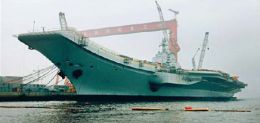Difference between revisions of "Varyag"
imported>Ciic |
imported>Ciic |
||
| Line 9: | Line 9: | ||
According to Chinese military experts, the carrier has a displacement of nearly 60,000 metric tons. It is a conventionally-powered medium-sized carrier that will be equipped with indigenous Chinese engines, ship-borne aircraft, radar and other hardware. Fixed-wing aircraft on the carrier will use a ski-jump to take off of the vessel, instead of a catapult system, after the refitting is completed. | According to Chinese military experts, the carrier has a displacement of nearly 60,000 metric tons. It is a conventionally-powered medium-sized carrier that will be equipped with indigenous Chinese engines, ship-borne aircraft, radar and other hardware. Fixed-wing aircraft on the carrier will use a ski-jump to take off of the vessel, instead of a catapult system, after the refitting is completed. | ||
| + | [[file:Aircraft Carrier Varyag2.JPEG|thumb|260px|Aircraft Carrier Varyag]] | ||
Once the refitting is completed, the aircraft carrier will make China the last of the five permanent members of the UN Security Council to own a carrier. Among the other four, the US boasts 11 and the UK, France and Russia each has one in operation. In Asia, India and Thailand each bought and commissioned an aircraft carrier - in the late 1980s and 1990s, respectively. | Once the refitting is completed, the aircraft carrier will make China the last of the five permanent members of the UN Security Council to own a carrier. Among the other four, the US boasts 11 and the UK, France and Russia each has one in operation. In Asia, India and Thailand each bought and commissioned an aircraft carrier - in the late 1980s and 1990s, respectively. | ||
| − | |||
The vessel Varyag began sea trails in August 2011 and on September 3 received the side designation "16," prompting speculation that the vessel had completed basic trails and would soon be commissioned. | The vessel Varyag began sea trails in August 2011 and on September 3 received the side designation "16," prompting speculation that the vessel had completed basic trails and would soon be commissioned. | ||
[[Category: National Defense]] | [[Category: National Defense]] | ||
Revision as of 01:36, 20 September 2012
Aircraft Carrier Varyag (瓦良格号航空母舰)
China is making use of an obsolete aircraft carrier - known as the Varyag (瓦良格) - that was bought from Ukraine and is being refitted for scientific research and training purposes. The 300 meter carrier is now stationed in the northeastern port of Dalian, Liaoning Province, and is expected to begin testing at sea soon.
The ex-Soviet Varyag, which remained incomplete when the Soviet Union collapsed in 1991, was bought for US$20 million in 1998. Ukraine disarmed it and removed its engines before selling the craft to China.
According to Chinese military experts, the carrier has a displacement of nearly 60,000 metric tons. It is a conventionally-powered medium-sized carrier that will be equipped with indigenous Chinese engines, ship-borne aircraft, radar and other hardware. Fixed-wing aircraft on the carrier will use a ski-jump to take off of the vessel, instead of a catapult system, after the refitting is completed.
Once the refitting is completed, the aircraft carrier will make China the last of the five permanent members of the UN Security Council to own a carrier. Among the other four, the US boasts 11 and the UK, France and Russia each has one in operation. In Asia, India and Thailand each bought and commissioned an aircraft carrier - in the late 1980s and 1990s, respectively.
The vessel Varyag began sea trails in August 2011 and on September 3 received the side designation "16," prompting speculation that the vessel had completed basic trails and would soon be commissioned.

